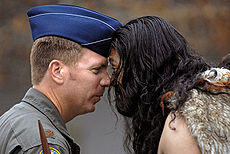- Hongi
-
A hongi is a traditional Māori greeting in New Zealand. It is done by pressing one's nose and forehead (at the same time) to another person at an encounter.
It is used at traditional meetings among Māori people and on major ceremonies and serves a similar purpose to a formal handshake in modern western culture, and indeed a hongi is often used in conjunction with one.
In the hongi, the ha (or breath of life), is exchanged and intermingled.
Through the exchange of this physical greeting, one is no longer considered manuhiri (visitor) but rather tangata whenua, one of the people of the land. For the remainder of one's stay one is obliged to share in all the duties and responsibilities of the home people. In earlier times, this may have meant bearing arms in times of war, or tending crops, such as kumara (sweet potato).
When Māori greet one another by pressing noses, the tradition of sharing the breath of life is considered to have come directly from the gods.
In Māori folklore, woman was created by the gods moulding her shape out of the earth. The god Tāne (meaning male) embraced the figure and breathed into her nostrils. She then sneezed and came to life. Her name was Hineahuone (earth formed woman).
Examples
- Performed by Hillary Clinton by a 04 November 2010 visit to Wellington New Zealand [1]
- Performed by Ambassador of Turkey[2]
- Performed by Prince William and Sir Paul Reeves[3]
See also
References
- ^ "Hillary Clinton's First Powhiri Hongi". scoop.co.nz. 2010 [last update]. http://www.scoop.co.nz/stories/HL1011/S00038/hillary-clintons-first-powhiri-part-1-images.htm. Retrieved 26 September 2011. "Scoop Images: Hillary Clinton's First Pōwhiri Hongi"
- ^ "Hongi | The Governor-General of New Zealand Te Kawana Tianara o Aotearoa". gg.govt.nz. 2011 [last update]. http://gg.govt.nz/node/3785. Retrieved 26 September 2011. "The Ambassador of Turkey, HE Ali Yakital, hongis a member of the Defence Force Cultural Party"
- ^ "Prince William on America's Cup yacht". newspix.photoshelter.com. 2011 [last update]. https://newspix.photoshelter.com/gallery-image/G000025vueO_0M_Q/I0000b5gzDEAoRUI/0. Retrieved 26 September 2011.
Gestures Friendly gestures Air kiss · A-ok · Cheek kissing · Dap greeting · Elbow bump · Eskimo kissing · Fist bump · Hat tip · High five · Hongi · ILY sign · Namaste · Sign of the horns · Shaka · Thumbs signal · WaiFormal gestures Salutes Bellamy salute · Nazi salute · Raised fist · Roman salute · Scout sign and salute · Three-finger salute · Two-finger salute · Vulcan salute · Zogist saluteCelebratory gestures Finger counting Obscene gestures Head motions Other gestures Air quotes · Anasyrma · Crossed fingers · Facepalm · Finger gun · Gang signal · Hand-rubbing · Jazz hands · Kuji-in · Laban sign · Loser · Mudra · Pollice verso · Puppy face · Shrug · Sign of the Cross · Varadamudra · V signRelated Categories:- Greetings
- New Zealand culture
- Māori stubs
Wikimedia Foundation. 2010.

